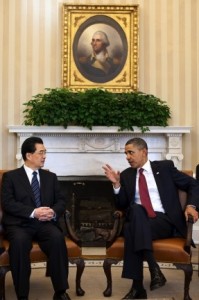Japan warned on Monday that a dispute with China over the territorial claims in the South China Sea could damage “peace and stability” in Asia, as President Obama completed a tour of nations in the region the US aims to keep under its influence.
 “Prime Minister Noda raised the issue of the South China Sea, noting that this is of common concern for the international community, which would have direct impact on peace and stability of the Asia-Pacific,” a Japanese government statement said.
“Prime Minister Noda raised the issue of the South China Sea, noting that this is of common concern for the international community, which would have direct impact on peace and stability of the Asia-Pacific,” a Japanese government statement said.
The US role in this and various other Asian territorial disputes is not one of a neutral player trying to avoid escalation. Rather, the US has pursued an aggressive posture of expanding military assets in the region and teaming up with all of China’s neighboring rivals to side with them on territorial issues in a nationalistic scheme to block China’s rise as a world power.
“There is a danger of China and Japan having a military conflict,” Yan Xuetong, one of China’s most influential foreign policy strategists told the Telegraph. “One country must make a concession. But I do not see Japan making concessions. I do not see either side making concessions.”
Underlying the dispute are two key factors: (1) Washington has reiterated its commitment to its mutual defense treaty with Japan, insisting that it will become involved militarily in the event of an outbreak of conflict; (2) Washington sees Chinaas a rising power with increasing regional influence and is willing to crush that ascent to maintain its own global dominance.


